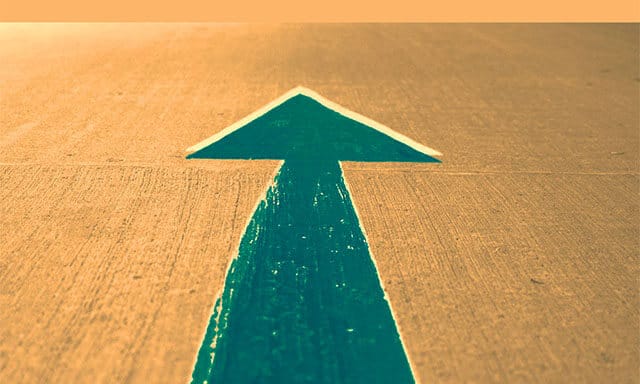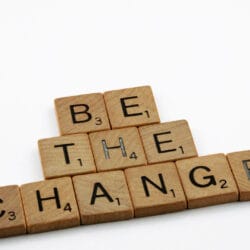When we hear all the elites, celebrities, and even ourselves, talk about how we want…
Change is a word that can excite and dread people. Here we look at why people don’t change or adapt even if they want to.
The main reason why people don’t change or adapt is actually very simple.
We latch into something. We stop ourselves from change because sticking to what we already know is easier.
Humans tend to stick to an implanted idea rather than adapt to a changing environment.
This is because we are programmed to find and follow routines, but routines only serve to repeat daily tasks that need doing, again and again, not to adapt to changing situations.
So, if you suddenly lost your job and you were used to being transfixed on one specialist skillset then you would find it hard to see that your skills could actually be used in multiple ways.
Any skill you develop can be adapted and become a transferable skill, it’s just learning how to with techniques like quick adaption, applied knowledge, and active learning.
Risk Aversion Is At The Heart Of Why People Don’t Change


Think of playing a game of Risk with some friends, and one friend attacked your base that you set upon at the start.
Most likely people would seek out to regain that base, their associated comfort zone, even though now there are probably better positions on the board to move to.
It can lead to them missing better plays as their minds are fixed to the one place they started.
This is why many people struggle to move away from their home environments, with the majority of people in the world staying in their home countries their whole life, other than heading for travel trips of pleasure or forced situations where they have to move to survive away from war torn or poverty stricken environments.
Now some people simply can’t afford to move anywhere else, (and in the pandemic just can’t move anywhere else), but often it’s an unconscious underlying fear in stepping outside of their comfort zone.
If we are truly honest, there’s not a great deal of people who can deal with being out of their comfort zone for too long as it is hard to do.
What Else Is Stopping People From Changing?
Now it’s not to say people don’t want to change (although there are people who are happy not to as well), yet the action of changing is far harder than the prepping for change, which ends up stopping people.
Just look at the countless blogs and articles out there about personal development and wellbeing.
People want to be happy and often want to change and improve their situation they might not be happy with, but the actual steps in doing so are far harder in reality than in theory.
Many people write blogs themselves as part of their own journey to change, and despite growing audiences and inspiring positive information many readers (and authors) would still revert back to set ways after.
“Humans tend to stick to an implanted idea rather than adapt to a changing environment”
Richly Wills
Why?
Again, it’s easier to stick than it is to shift.
Change is always hard at first as it forces you to deal with being out of your comfort zone, but it does get easier.
After initial struggles people more often than not adapt, and it becomes easier thereafter as they then have a lot more opportunities & tools at their disposal than they did before.
As you adapt to changing situations with experience you then know how to play the right move instead of get stuck in your initial base (if that base is no longer right for your current journey through life).
Not So Fast, A Consistent Mentality Shift Is Needed First


So, if it gets easier then why do many people still avoid change?
It’s a lot to do with the language and scripts we tell ourselves or which are ingrained in us already (often from childhood).
Let’s say you told yourself you didn’t like something. Do you think you would find it harder or easier to do it if you told yourself it wasn’t something you could do?
Of course, you’d find it harder.
We all likely have certain things we tell ourselves we don’t like but have to do at times anyway.
Maybe you really don’t like coding but found you had to do some to get yourself to do something else beyond that which you do want to do.
Well, you could just employ someone else to do that thing for you, and sometimes that is the best solution for progress, but does it really help you get over your belief that you don’t like it or you can’t do it?
No, of course it doesn’t.
It’s like people who are afraid of cats or snakes (enter animal of dislike here).
To some other people they would be wondering why on earth you don’t like cats, but people are ingrained to fears in different ways, but the solution to get over them is all the same.
It’s always down to facing them, to stop telling yourself ‘no’ and to start believing that you can, and then to take steps (even hard ones) to push past that fear.
How Do You Face The Fear Of Change?
- Believe in yourself
- Trick your mind to rewrite scripts
- Drop your ego
- Seek ways to adapt
- Take small daily steps each day
While there is toxic positivity at times in the cliched ‘believe in yourself’, when it comes to fears and dislikes you should absolutely seek to develop the confidence and belief in yourself.
With risk of sounding cliche this isn’t meant to be pop psychology advice. Of course people should believe in themselves, but often people can’t because the fears are rooted deeper than the belief.
So, what can you do?
You have to begin rewriting your story, rewrite the scripts. Trick yourself to act think and act a different way than before.


You can’t adapt if you do try to change your current mindset.
This starts with telling yourself you ‘do like something’, or at least, you can do something even if you don’t like it.
It also helps dramatically to seek to drop your ego, as often our search for validation is what gets in the way of is truly finding what we want or need in life.
With ego in the way people have their defense barriers up. They convince themselves their bias is right so they can be stubborn and don’t need to change.
There’s plenty of people who say they don’t actually want to change but underneath they are crying out to. Their ego is often in the way.
To adapt is often to challenge fears first, and then through doing so it becomes a lot easier to adapt to new fears or challenges that arise thereafter.
Other than tricking your mind and dropping your ego, you can simply accept failure as part of growing.
When something in life doesn’t go the way you planned it’s not because you failed (unless you simply didn’t try), but because life isn’t a linear game where the same rule applies to every situation.
Another thing you can do is seek out opportunities to adapt in the realms of comfort at first, such as playing strategy games (such as Risk) where you have to adapt to the boards changing conditions to win.
Consistency is the key.
We often think consistency is about keeping up routines but it also applies to adapting to changing situations.
When we take small steps of change each day it helps us adapt and change easier over time. We break the fears or routines that are stifling is to think we can’t change.
Elementor here
What Benefits Do You Get From Seeking Change?
Going back to the game of Risk, when your mind is open to change you will likely see a lot of different plays ahead of other people and win the game whilst others stay in the same base they started in rather than adapting too.
Of course, life is different to a strategy board game, but the principle is still the same.
When you become transfixed on doing the same thing again and again, you might get good at one thing, but you leave yourself very short in many other departments, and in a world that will need to adapt more and more to an ever-changing and disruptive workplace and globalized community.
When you are used to change, then this doesn’t phase you and you actually spot opportunity amongst the change.
Let’s face it, if you don’t adapt your base will ultimately be attacked at some point and you will lose the game trying to defend it rather than adapting to the changing environment.









